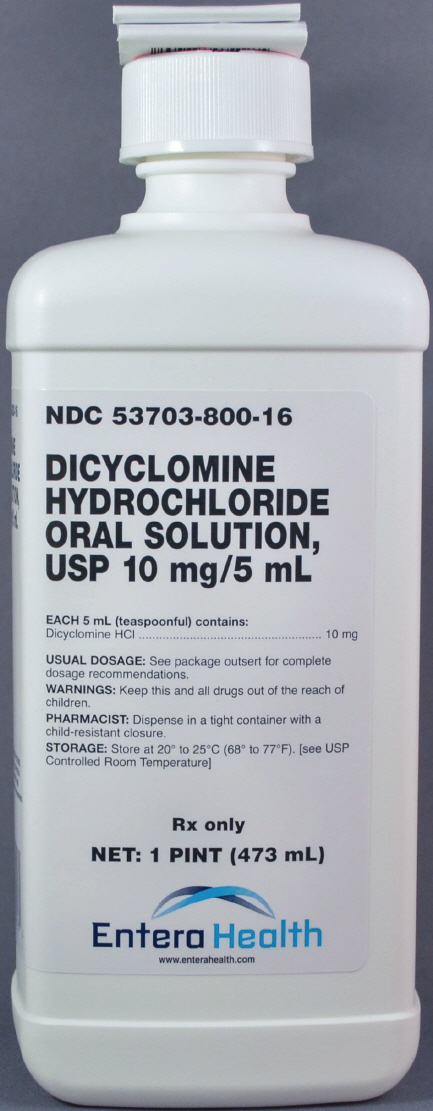FDA records indicate that there are no current recalls for this drug.
Are you a medical professional?
Trending Topics
Dicyclomine Hydrochloride Syrup Recall
Get an alert when a recall is issued.
Questions & Answers
Side Effects & Adverse Reactions
In the presence of a high environmental temperature, heat prostration can occur with drug use (fever and heat stroke due to decreased sweating). If symptoms occur, the drug should be discontinued and supportive measures instituted.
Diarrhea may be an early symptom of incomplete intestinal obstruction, especially in patients with ileostomy or colostomy. In this instance, treatment with this drug would be inappropriate and possibly harmful.
Dicyclomine hydrochloride oral solution may produce drowsiness or blurred vision. The patient should be warned not to engage in activities requiring mental alertness, such as operating a motor vehicle or other machinery or performing hazardous work while taking this drug.
Psychosis has been reported in sensitive individuals given anticholinergic drugs. CNS signs and symptoms include confusion, disorientation, short-term memory loss, hallucinations, dysarthria, ataxia, coma, euphoria, decreased anxiety, fatigue, insomnia, agitation and mannerisms, and inappropriate affect.
These CNS signs and symptoms usually resolve within 12 to 24 hours after discontinuation of the drug.
There are reports that administration of dicyclomine hydrochloride oral solution to infants has been followed by serious respiratory symptoms (dyspnea, shortness of breath, breathlessness, respiratory collapse, apnea, asphyxia), seizures, syncope, pulse rate fluctuations, muscular hypotonia, and coma. Death has been reported. No causal relationship between these effects observed in infants and dicyclomine administration has been established. DICYCLOMINE HYDROCHLORIDE ORAL SOLUTION IS CONTRAINDICATED IN INFANTS LESS THAN 6 MONTHS OF AGE AND IN NURSING MOTHERS. (see CONTRAINDICATIONS and PRECAUTIONS: Nursing Mothers and Pediatric Use).
Safety and efficacy of dicyclomine hydrochloride in pediatric patients have not been established.
Legal Issues
There is currently no legal information available for this drug.
FDA Safety Alerts
There are currently no FDA safety alerts available for this drug.
Manufacturer Warnings
There is currently no manufacturer warning information available for this drug.
FDA Labeling Changes
There are currently no FDA labeling changes available for this drug.
Uses
Dicyclomine hydrochloride oral solution is indicated for the treatment of functional bowel/irritable bowel syndrome.
History
There is currently no drug history available for this drug.
Other Information
Dicyclomine hydrochloride oral solution is an antispasmodic and anticholinergic (antimuscarinic) agent. Each 5 mL (teaspoonful) of dicyclomine hydrochloride oral solution for oral administration contains:
Dicyclomine HCl 10 mg
Also contains glycerin, methylparaben, propylene glycol, propylparaben, purified water, sorbitol solution, sucrose, with D&C Red #33, FD&C Blue #1, FD&C Red #40, FD&C Yellow #6 as coloring, and natural and artificial tropical fruit punch flavoring.
Chemically, dicyclomine hydrochloride is [bicyclohexyl]-1-carboxylic acid, 2-(diethylamino)ethyl ester, hydrochloride. Dicyclomine hydrochloride occurs as a fine, white, crystalline, practically odorless powder with a bitter taste. It is soluble in water, freely soluble in alcohol and chloroform, and very slightly soluble in ether. Its structural formula is as follows:
C19H35NO2∙HCl M.W. 345.95
Sources
Dicyclomine Hydrochloride Syrup Manufacturers
-
Entera Health, Inc.
![Dicyclomine Hydrochloride Syrup [Entera Health, Inc.]](/wp-content/themes/bootstrap/assets/img/loading2.gif)
Dicyclomine Hydrochloride Syrup | Entera Health, Inc.
![Dicyclomine Hydrochloride Syrup [Entera Health, Inc.] Dicyclomine Hydrochloride Syrup [Entera Health, Inc.]](/wp-content/themes/bootstrap/assets/img/loading2.gif)
DOSAGE MUST BE ADJUSTED TO INDIVIDUAL PATIENT NEEDS. (See CLINICAL PHARMACOLOGY.)
Adults-OralThe only oral dose clearly shown to be effective is 160 mg per day (in 4 equally divided doses). Since this dose is associated with a significant incidence of side effects, it is prudent to begin with 80 mg per day (in 4 equally divided doses). Depending upon the patient's response during the first week of therapy, the dose should be increased to 160 mg per day unless side effects limit dosage escalation.
If efficacy is not achieved within 2 weeks or side effects require doses below 80 mg per day, the drug should be discontinued. Documented safety data are not available for doses above 80 mg daily for periods longer than 2 weeks.
ElderlyIn general, dose selection for an elderly patient should be cautious, usually starting at the low end of the dosing range, reflecting the greater frequency of decreased hepatic, renal, or cardiac function, and of concomitant disease or other drug therapy. (See PRECAUTIONS Geriatric Use)
Login To Your Free Account


